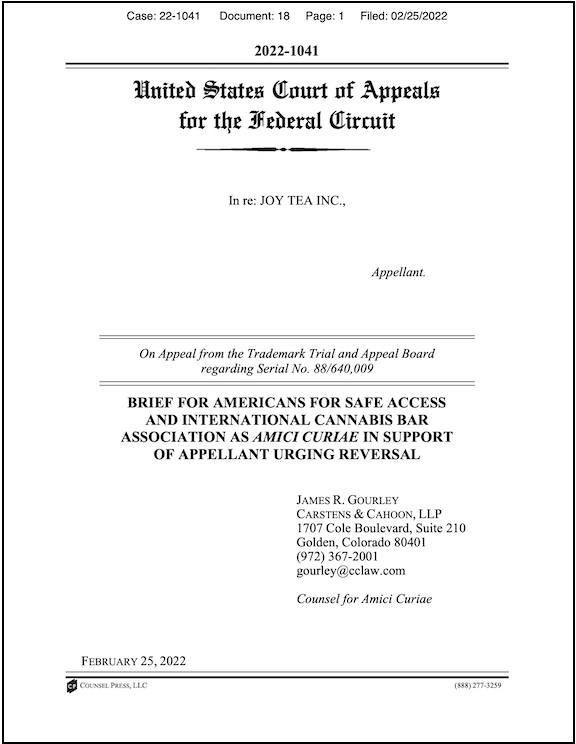ASA Activist Newsletter - March 2022
In this Issue:
- ASA Files Brief on Cannabis Trademarks
- PFC Holds Webinar on Vape Recalls
- ASA Events: University of Maryland, April 22
- New ASA Podcasts Available
- Activist Profile: Carla Basante, New Jersey
____________________
ASA and International Cannabis Bar Association File Brief on Trademarks
Americans for Safe Access is taking steps to defend the intellectual property rights of the cannabis industry. Last month, ASA and the International Cannabis Bar Association (INCBA) filed an Amicus Brief arguing that cannabis and hemp products should be eligible for trademarks.
 The brief from ASA and the INCBA was filed in the case of Joy Tea, Inc., a company that was denied a trademark for its CBD tea. The brief argues that USPTO interpretation of trademark regulations deprives both consumers and hemp and cannabis companies basic protections available to other product sectors.
The brief from ASA and the INCBA was filed in the case of Joy Tea, Inc., a company that was denied a trademark for its CBD tea. The brief argues that USPTO interpretation of trademark regulations deprives both consumers and hemp and cannabis companies basic protections available to other product sectors.
Cannabis and hemp brands are currently unable to obtain trademarks on their products in the U.S. because the United States Patent Trademark Office (USPTO) says they violate a "lawful use requirement."
“Lack of trademark protection hurts patients, consumers, and companies,” said Debbie Churgai, ASA’s executive director. “Patients rely on branding to identify product sources, safety, and consistency. Businesses rely on trademarks to curtail counterfeited products and ensure that customers know exactly what they are buying.”
The USPTO can grant a trademark registration in advance of a product being brought to market, based on an intent-to-use application that requires the applicant to use the mark in lawful commerce within 36 months. Because federal law still prohibits cannabis and certain hemp products, the USPTO says those products cannot be trademarked.
“Effecting change at the USPTO to protect cannabis and hemp brands is critical to achieving consumer protection across the country,” said Mary Shapiro, INCBA advisory board member and ASA board member.
The USPTO has applied a per se interpretation of trademark rules, meaning that any product derived from cannabis is considered inherently out of bounds. That includes food, beverage, and other ingestible products containing CBD derived from hemp, even when the product is legal under the federal 2018 Farm Bill, which created a path for the manufacture and sale of legal hemp products everywhere in the U.S.
 “We believe that it is time to allow the cannabis industry and our patients the same rights and protections as ‘traditional’ industries,” said James Gourley, appellate counsel for ASA and INCBA (pictured at left).
“We believe that it is time to allow the cannabis industry and our patients the same rights and protections as ‘traditional’ industries,” said James Gourley, appellate counsel for ASA and INCBA (pictured at left).
ASA and INCBA contend that Congress has made clear its intent to allow the regulation of at least some cannabis products. In addition to the 2018 Farm Bill, Congress has continuously reauthorized budget measures that prevent the Department of Justice from interfering with state-authorized medical marijuana laws.
"The lack of federal trademark protection in the United States for the cannabis sector has had and will continue to have disastrous effects for patients, consumers, and the many responsible brand owners continuing to innovate in this fast-growing sector,” said Shabnam Malek, INCBA co-founder, former president and board member. “This litigation and the work ASA and INCA have done, including Mary Shapiro and James Gourley, who co-wrote the Amicus Brief pro bono, will have impact far beyond a single trademark registration -- if we are successful in moving the needle, much needed protection for patients and consumers will soon follow."
Consumers can purchase legal, regulated cannabis products in 38 states and the District of Columbia, and hemp products (except infused foods and beverages and supplements) are lawful under federal law throughout the country.
For more information, see ASA’s press release and the amicus brief.
____________________
PFC Holds Webinar on Vape Recalls
Americans for Safe Access’ PFC Director Heather Despres held a free webinar last month on cannabis vape product safety and regulatory compliance.
These popular devices heat cannabis oil extracts to a temperature that releases active ingredients in a vapor without the smoke byproducts, but contaminants and the presence of other potentially harmful substances have led to health problems and product recalls.
 Most recently, on February 4, 2022 the Pennsylvania Office of Medical Marijuana issued a recalled over 500 different cannabis vape products because they contain substances not suitable for inhalation.
Most recently, on February 4, 2022 the Pennsylvania Office of Medical Marijuana issued a recalled over 500 different cannabis vape products because they contain substances not suitable for inhalation.
Pennsylvania is not the only state to conduct recalls of vaping products. In 2020, Oregon asked retailers to voluntarily recall vape products containing squalene and squalane, and Michigan issued a recall of almost 10,000 vape products because they might contain Vitamin E acetate.
Vitamin E acetate and other chemicals sometimes used to keep cannabis extracts in liquid form for vaping were identified as a serious health risk a few years ago. Use of products containing those chemicals has been associated with vaping associated pulmonary injury (VAPI), which sickened over 2,800 people and led to 68 fatalities in 2019. The chemicals that were the source of the outbreak are more likely to be found in illicit market products, as state regulations now prohibit their use.
Since extraction techniques can fail to capture the terpenes and flavonoids that give cannabis distinctive aromas and flavors, some manufacturers have also added synthetic terpenes that can break down when vaped into potentially dangerous substances not present in the plant. Those practices have also been banned.
“State regulations and accurate testing of cannabis vape products protect users, but that doesn’t stop unscrupulous manufacturers in the illicit market from using these substances,” said Despres. “Anyone using cannabis vape products should rely on the legal cannabis market, where these products are tested and labeled.”
A recording of the free PFC webinar will be available on ASA's YouTube channel soon.
____________________
ASA Events: University of Maryland, April 22
ASA Executive Director Debbie Churgai will be giving a presentation on “Medical Cannabis Advocacy” at the University of Maryland School of Pharmacy Spring Symposium on April 22, 2022 as part of the university’s master of science program in Medical Cannabis Science and Therapeutics. She will also serve as a moderator for a breakout session on advocacy in the afternoon.
____________________
New Podcasts with ASA Available
New Cannabis Enigma podcasts are available, featuring expert discussions about medicinal cannabis and segments from Abbey Roudebush discussing ASA’s State of the States Report and William Dolphin talking about mental health aspects of cannabis use. Produced by The Cannigma in partnership with Americans For Safe Access, podcast episodes are available at safeaccessnow.org/podcasts.
ASA Executive Director Debbie Churgai was featured on four podcasts last month, covering aspects of the State of the States Report as well as the benefits of certification for cannabis businesses.
Move the Stairs On this episode of Move the Stairs, Churgai talks about how businesses can acquire the tools for strong advocacy and prepare partners for changing regulations, as well as how certification creates product transparency for consumers that differentiates businesses.
Montel Williams’ Let’s Be Blunt Churgai joined Montel Williams on the latest episode of his Let’s Be Blunt podcast to discuss highlights from ASA's recently released 2021 State of the States Report: An Analysis of Medical Cannabis Access in the United States.
The Vine #62 On the latest podcast from Plant Media Project, Churgai talks about the 2021 State of the State report, why states received such poor scores, and what can be done to bring greater access to patients and consumers everywhere.
Natural Awakenings On the Natural Awakenings podcast, Churgai talks about what the 2021 State of the States report says about how the PA Medical Cannabis Program can improve safe access for patients.
All these podcast episodes and more are available for streaming at safeaccessnow.org/podcasts.
____________________
Activist Profile: Carla Basante, New Jersey
Carla Basante began using cannabis about 15 years ago to manage chronic pain from a severe back injury and symptoms of multiple sclerosis. A breast cancer survivor, Carla has had two back surgeries to treat the damage caused by a bad car crash when she was in her early 40s, as well as a nerve ablation and other procedures.
After doctors had trouble explaining the various symptoms she was experiencing after that accident, an MRI revealed she was also suffering from multiple sclerosis. The trauma of the back injury had “activated” her lurking MS, leading to seizures and other debilitating problems. What followed was a medicine cabinet full of powerful pharmaceutical drugs.
“Oxy, Percocet, valium – they’d prescribe anything, even steroids,” Carla remembers. The unpleasant side effects of the medications she was initially prescribed for her conditions led her to investigate alternatives.
“My son was a factor. I wanted to be a mother, but I didn’t recognize myself,” Carla says.
She found that cannabis provided relief without the many side effects of other medications. Once she found a cannabis regimen that worked, she was able to go off 10 other drugs.
 “It’s horrible to live with chronic illness and chronic pain, but it’s been years since I’ve had to take steroids, and I haven’t had MS episodes,” Carla says. “If I wasn’t medicating with cannabis, I couldn’t function.”
“It’s horrible to live with chronic illness and chronic pain, but it’s been years since I’ve had to take steroids, and I haven’t had MS episodes,” Carla says. “If I wasn’t medicating with cannabis, I couldn’t function.”
Her research on medical cannabis also led her to Americans for Safe Access. She has attended ASA’s annual unity conference in Washington, D.C. three times, first in 2017, and has lobbied on Capitol Hill.
“That ASA conference changed my life,” Carla says. “I met patients from all walks of life – lawyers, doctors, parents of children with Dravet Syndrome.”
Carla’s direct advocacy work began when she had to go in for another back surgery and was told she couldn’t use cannabis at the hospital. When she was sent to the rehabilitation center that weekend, they asked her if she was using any medications. When she told them, yes, she used cannabis, the staff said they were sorry, but this was a “no flame” facility.
“No problem,” Carla said. “I’ve got a vape pen, so no flame.”
Stumped by that, the nurse set up a medication schedule with her for her cannabis use. When the administrative folks returned to work on Monday, they told Carla she’d have to stop.
“I told them, no, we’ve already got a schedule, and it’s not causing anyone any problems,” Carla recalls. They said she would have to switch to dronabinol, the FDA-approved synthetic THC medicine. Instead, Carla opted for cannabis oils and medicated baked goods.
Carla would like to see cannabis be more available to those in need, and for medical facilities to provide cannabis lounges for patients.
“The amount of pills being doled out is frightening, particularly for our elderly population. It’s a free for all,” Carla says. “If they were able to use cannabis in different forms, it would save them from the dangerous side effects.”
Carla was back at that rehab center a year ago because her mother was receiving care there and was surprised to have the staff remember her.
“I was wearing a mask, but aides were pointing. ‘You were here before,’” Carla says. “They remembered me going outside in my wheelchair to use the vape pen.”
Carla’s self-advocacy had made an impression.
“My thing is cannabis use for facilities, hospitals, prisons, nursing, rehab, even schools – all the places that receive federal funds and say you can’t use cannabis as medicine,” Carla says. “I have a friend with a son in high school in New Jersey who is finally able to administer his cannabis in school.”
 Because of her son, Carla has had to deal with the anti-cannabis messages common to schools. He was 7 years old when she started using cannabis, and she worked to educate him about “mom’s medicine,” but things changed when he got to middle school and was exposed to strident anti-cannabis messages. Carla had been showing him ASA materials and her collection of books about the medical uses of cannabis, but the conflicting messages led to arguments. He wanted her to stop.
Because of her son, Carla has had to deal with the anti-cannabis messages common to schools. He was 7 years old when she started using cannabis, and she worked to educate him about “mom’s medicine,” but things changed when he got to middle school and was exposed to strident anti-cannabis messages. Carla had been showing him ASA materials and her collection of books about the medical uses of cannabis, but the conflicting messages led to arguments. He wanted her to stop.
“I’m more engaged, more active – don’t you see the difference?” Carla remembers asking him. “It’s not taking away all the pain, not curing MS, but now I’m functional. Isn’t that what we want? I wouldn’t be able to hold a job without it.”
When her son told her about a poster in his guidance counselor’s office that said cannabis use leads to cocaine and other hard drugs, she went to the school, much to her son’s embarrassment.
“Why would you have this up?” Carla asked the guidance counselor. “You’re an educator. Why would you not educate yourself?”
She remembers her son’s complaints about how she was bringing attention to her cannabis use.
“I know,” she told him. “You know how much this has helped me.”
It was a hard three years, but by the time her son got to high school, the switch had flipped. He saw the stigma was wrong. When he got to college, he discovered his university has a cannabis curriculum and took a couple of courses.
“I’ll always remember the smile on his face when he said, ‘Look what they offer!’” Carla says. “That’s the best thing ever.”
From that experience, Carla has learned that we have to do cannabis education one on one, whether that is with children or medical professionals. She makes use of expert resources, but she also knows her own story makes a powerful case.
“I’m the healthiest unhealthy person, thanks to cannabis use,” Carla says.
____________________
Action Alert: Show Your Support
As a grassroots organization, ASA relies on individual members to spread the word and provide the support needed to defend safe access. Join ASA today or renew your membership to be part of the only national organization committed to fighting for patients and improving laws to better serve them. You can also make a tax-deductible donation to Americans for Safe Access Foundation, a 501(c)3 nonprofit (Federal ID 51-0579227).
Please help spread the word. For all our victories, millions of Americans still lack safe access. Even in states with medical cannabis programs, many qualifying patients are excluded, including government employees and contractors, those living in Section 8 housing, patients in assisted living or hospice, individuals with workplace drug testing, even veterans. Others find themselves unable to utilize the programs due to prohibitive costs or access barriers.
Tell your family and friends why safe access matters and what ASA is doing to protect patients and promote better laws and regulations. Share this newsletter, the latest State of the States Report, ASA’s podcast and website links, or any of the advocacy and informational tools ASA provides.
To make a tax deductible contribution, visit SafeAccessNow.org/donate or mail a check to Americans for Safe Access Foundation, 1629 K Street NW, Suite 300, Washington, DC 20006.
____________________
Download a PDF of this newsletter to print and share!
____________________
Share this page























